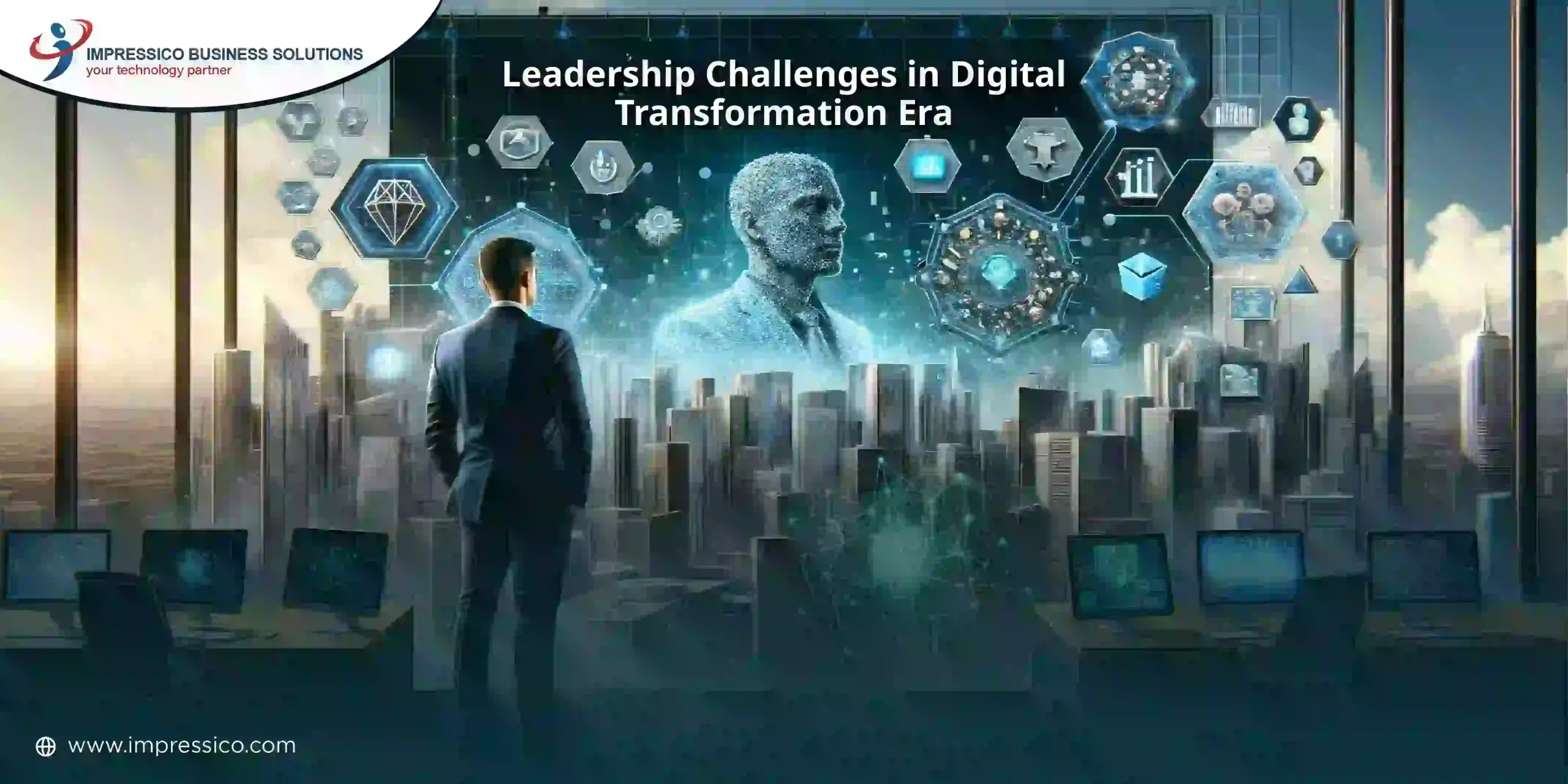Leadership Challenges in Digital Transformation Era

In the ever-evolving landscape of the Digital transformation era, leaders are navigating through a maelstrom of challenges that redefine the very essence of business dynamics.
As organizations endeavor to harness the power of IoT solutions and services, generative AI Services, and seek expert digital transformation consulting from IoT Solutions Company, the role of leadership metamorphoses to meet the demands of innovation and change. In this post we will discuss challenges that comes in digital transformation era!
Leadership Challenges in the Digital Transformation Era
Digital transformation has become a crucial aspect of organizational growth in the modern era. While it brings about numerous benefits, leaders face several challenges in navigating their teams through this transformative journey.
Leadership in the Digital Age
Understanding and addressing these challenges is vital for successful digital transformation consulting initiatives.
Cultural Resistance:
- Challenge: One of the primary challenges is resistance to change within the organizational culture. Employees may be accustomed to traditional methods, and embracing digital transformation requires a cultural shift.
- Solution: Leaders should foster a culture of innovation like Generative AI Services, encourage open communication, and provide training to help employees adapt to new technologies.
Skill Gaps:
- Challenge: Rapid technological advancements often result in skill gaps within the workforce. Existing employees may lack the necessary skills for the digital tools and processes.
- Solution: Investing in training programs, upskilling, and hiring individuals with relevant expertise can help bridge the skill gaps and ensure a workforce ready for the digital age.
Change Management:
- Challenge: Managing the transition from legacy systems to new digital platforms can be disruptive. Resistance and confusion among employees may hinder the smooth execution of digital transformation initiatives.
- Solution: Leaders need a robust change management strategy, including clear communication, employee involvement, and a phased approach to implementation, minimizing disruptions.
Cybersecurity Concerns:
- Challenge: With increased reliance on digital technologies, the risk of cyber threats and data breaches becomes more pronounced. Ensuring cybersecurity is a significant challenge for leaders.
- Solution: Implementing IoT solutions and services and robust cybersecurity measures, conducting regular audits, and creating awareness among employees about cybersecurity best practices are essential steps.
Integration of Technologies:
- Challenge: Organizations often use a mix of new and legacy systems. Integrating these diverse technologies to work seamlessly can be complex and time-consuming.
- Solution: Leaders should invest in interoperable technologies, APIs from trusted IoT Solutions Company and platforms that facilitate smooth integration. A well-thought-out integration strategy is crucial for success.
Data Privacy and Compliance:
- Challenge: The increased use of data in digital transformation raises concerns about privacy and compliance with regulations such as GDPR or HIPAA.
- Solution: Leaders must prioritize data governance, implement robust privacy policies from IoT Solutions Company, and stay informed about evolving regulations to ensure compliance and build trust.
Uncertain ROI and Metrics:
- Challenge: Measuring the return on investment (ROI) and defining clear metrics for digital transformation initiatives can be challenging, making it difficult to assess success.
- Solution: Leaders should establish measurable KPIs aligned with organizational goals, regularly evaluate progress, and adjust strategies based on data-driven insights.
Leadership in the Digital Age
Digital-age leadership encompasses the styles and strategies that prove most effective in the contemporary digital landscape. It requires a profound grasp of technology, the adept use of digital tools to achieve organizational objectives, and a commitment to staying informed about technological trends. Leaders navigating the digital age prioritize traits such as agility, efficiency, innovation, collaboration, and creativity within their teams.
These leaders leverage a diverse range of communication channels, including mobile apps and videoconferencing, to maintain connectivity with their teams, irrespective of geographical locations.
They harness insights derived from data to inform decision-making, and they actively seek ways to use technology for operational streamlining, eliminating redundancies, and delivering tangible business value. Ultimately, adept leadership in the digital age is the linchpin for unlocking the full potential of modern businesses in this era increasingly defined by technology.
Skills Essential for Leadership in the Digital Age
Leading in the digital age demands a unique set of skills that go beyond traditional leadership qualities. Here are the key skills required:
Digital Literacy:
- Understanding Technology: Leaders must have a strong understanding of current and emerging technologies relevant to their industry.
- Adaptability: The ability to quickly adapt to new technologies and tools is crucial in a rapidly evolving digital landscape.
Data Literacy:
- Data-Driven Decision Making: Leaders should be adept at interpreting and utilizing data to make informed decisions.
- Analytics: Proficiency in using analytics tools and understanding data trends is essential.
Innovation Mindset:
- Creativity: Encouraging and fostering a culture of creativity and innovation within the team.
- Risk-Taking: Being open to calculated risks and experimentation to drive innovation.
Agile Leadership:
- Flexibility: Embracing change and being flexible in adapting to evolving circumstances.
- Agile Methodologies: Understanding and applying agile methodologies to enhance team efficiency.
Effective Communication:
- Digital Communication: Proficiency in using digital communication channels for effective collaboration.
- Clear Articulation: The ability to articulate ideas clearly in a virtual and digital environment.
Cybersecurity Awareness:
- Security Consciousness: Leaders should be aware of cybersecurity threats and promote a security-conscious culture within the organization.
Global Mindset:
- Cultural Awareness: Understanding cultural nuances in a globalized digital environment.
- Remote Collaboration: Facilitating collaboration among team members across different geographical locations.
Continuous Learning:
- Lifelong Learning: Commitment to continuous learning and staying updated on industry trends.
- Skill Development: Encouraging and providing opportunities for team members to upskill.
Emotional Intelligence:
- Virtual Leadership: Effectively leading and managing teams in a virtual setting.
- Empathy: Demonstrating empathy and understanding the unique challenges of a digital workforce.
Strategic Vision:
- Digital Strategy: Developing and executing a robust digital strategy aligned with overall business goals.
- Future Outlook: Anticipating future digital trends and aligning the organization accordingly.
Leaders who possess and continually develop these skills are better equipped to navigate the complexities of the digital age and drive success in their organizations.
Conclusion
As we navigate the intricacies of the digital transformation era, leaders are faced with a unique set of challenges that demand adaptability, foresight, and a commitment to continuous learning. The journey of transforming any organization into a digitally empowered entity is fraught with obstacles but is also rife with opportunities for growth and innovation.
Understanding the complexities of leadership during such transformative times is critical for success. As you reflect on your own leadership journey within this context, remember that solutions exist to guide and aid you in this evolution.
Impressico stands as a beacon in this digital terrain, offering top-tier IoT solutions and services, generative model AI expertise, and insightful digital transformation consulting. Embrace the future confidently with Impressico— your partner in navigating the digital currents with competence and vigor. Let’s embark on this transformative quest together, leveraging technology to lead with vision and strategy.
FAQ's - Digital Transformation Services
What are the key challenges faced by leaders in the digital transformation era?
Leaders in the digital transformation era face challenges such as adapting to rapid technological changes, fostering a culture of innovation, and ensuring a smooth transition for the entire organization.
How does the pace of technological change impact leadership in the digital era?
The rapid pace of technological change requires leaders to stay informed, adapt quickly, and guide their teams through continuous learning to leverage new technologies effectively.
What role does organizational culture play in digital transformation leadership?
Organizational culture is crucial, as leaders need to cultivate a culture that embraces change, encourages experimentation, and values collaboration to drive successful digital transformations.
How can leaders overcome resistance to change during digital transformation?
Leaders can overcome resistance by fostering open communication, providing adequate training, showcasing benefits, and involving employees in the transformation process.
